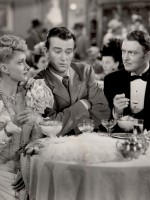Roy Rogers is a Actor American born on 5 november 1911 at Cincinnati (USA)

Roy Rogers (born Leonard Franklin Slye; November 5, 1911 – July 6, 1998) was an American singer and cowboy actor who was one of the most popular Western stars of his era. Known as the "King of the Cowboys", he appeared in over 100 films and numerous radio and television episodes of The Roy Rogers Show. In many of his films and television episodes, he appeared with his wife Dale Evans, his golden palomino Trigger, and his German Shepherd dog Bullet. His show ran on radio for nine years before moving to television from 1951 through 1957. His productions usually featured a sidekick, often Pat Brady, Andy Devine, or George "Gabby" Hayes. In his later years, Rogers lent his name to the Roy Rogers Restaurants franchised chain.
Rogers (Leonard Slye) was born to Mattie (née Womack) and Andrew "Andy" Slye in Cincinnati, Ohio. The family lived in a tenement building on 2nd Street, where Riverfront Stadium would later be constructed (Rogers would later joke that he was born at second base). Dissatisfied with his job and city life, Andy and his brother Will built a 12-by-50-foot (3.7 m × 15.2 m) houseboat from salvage lumber, and in July 1912 the Slye family traveled up the Ohio River towards Portsmouth, Ohio. Desiring a more stable existence in Portsmouth, they purchased land on which to build a house, but the Great Flood of 1913 allowed them to move the houseboat to their property and continue living in it on dry land.
In 1919 the Slye family purchased a farm in Duck Run, located near Lucasville, Ohio about 12 miles (19 km) north of Portsmouth, and built a six-room house. Andy Slye soon realized that the farm alone would provide insufficient income for his family, so he took a job at a Portsmouth shoe factory, living in Portsmouth during the week and returning home on weekends bearing gifts following paydays. A notable gift was a horse on which young Len Slye learned the basics of horsemanship. Living on the farm with no radio, the family made their own entertainment. On Saturday nights, the family often invited neighbors over for square dances, during which Len would sing, play mandolin, and call the square dances. He also learned to yodel during this time, and he and his mother would use yodeling calls to communicate with each other across distances on the farm.
After completing the eighth grade, Len attended high school in McDermott, Ohio. After completing his second year in high school, his family returned to Cincinnati, where his father began work at another shoe factory. Realizing that his family needed his financial help, Len quit school and joined his father at the shoe factory. He tried to attend night school, but after being ridiculed for falling asleep in class, he quit school and never returned.
By 1929, after Len's older sister Mary and her husband moved to Lawndale, California, he and his father quit their factory jobs, packed up their 1923 Dodge, and drove the family to California to visit Mary. They stayed for four months before returning to Ohio. Soon after returning, Len had the opportunity to travel to California with Mary's father-in-law, and the rest of the family followed in the spring of 1930. The Slye family rented a small house near Mary, and Len and his father found employment driving gravel trucks for a highway-construction project.
In the spring of 1931, after the construction company went bankrupt, Len traveled to Tulare, California where he found work picking peaches for Del Monte. During this time he lived in a labor camp similar to the ones depicted in John Steinbeck's novel The Grapes Of Wrath. The economic hardship of the Great Depression was just as severe in California as it was in Ohio.
Music career
After Slye's return to Lawndale, his sister Mary suggested that he audition for the Midnight Frolic radio program, which broadcast over KMCS in Inglewood. A few nights later, wearing a Western shirt that Mary made for him, Slye overcame his shyness and appeared on the program playing guitar, singing, and yodeling. A few days later, he was asked to join a local country music group called The Rocky Mountaineers. Slye accepted the group's offer and became a member in August 1931.
By September 1931, Slye hired Canadian-born Bob Nolan who answered the group's classified ad in the Los Angeles Herald-Examiner that read, "Yodeler for old-time act, to travel. Tenor preferred." Although Nolan stayed with the group only a short time, he and Slye stayed in touch. Nolan was replaced by Tim Spencer.
In the spring of 1932, Slye, Spencer, and another singer, Slumber Nichols, left the Rocky Mountaineers to form a trio, which soon failed. Throughout that year, Slye and Spencer moved through a series of short-lived groups, including the International Cowboys and the O-Bar-O Cowboys. When Spencer left the O-Bar-O Cowboys to take a break from music, Slye joined Jack LeFevre and His Texas Outlaws, who were a popular act on a local Los Angeles radio station.
In early 1933, Slye, Nolan, and Spencer formed a group called the Pioneers Trio, with Slye on guitar, Nolan on string bass, and Spencer on lead vocals. The three rehearsed for weeks refining their vocal harmonies. During this time, Slye continued to work with his radio singing group, while Spencer and Nolan began writing songs for the trio. In early 1934, fiddle player Hugh Farr joined the group, adding a bass voice to the group's vocal arrangements. Later that year, the Pioneers Trio became the Sons of the Pioneers when a radio station announcer changed their name because he felt they were too young to be "pioneers". The name was received well and fit the group, who were no longer a trio.
By the summer of 1934, the popularity and fame of the Sons of the Pioneers extended beyond the Los Angeles area and quickly spread across the country through short syndicated radio segments that were later rebroadcast across the United States. After signing a recording contract with the newly founded Decca label, the Sons of the Pioneers made their first commercial recording on August 8, 1934. One of the first songs recorded by the group during that first August session was "Tumbling Tumbleweeds" written by Bob Nolan. Over the next two years the Sons of the Pioneers would record 32 songs for Decca, including the classic "Cool Water".
Film career
From his first film appearance in 1935, he worked steadily in Western films, including a large supporting role as a singing cowboy while still billed as "Leonard Slye" in a Gene Autry movie. In 1938, when Autry was demanding more money for his work, Slye was immediately rechristened "Roy Rogers". Actually, there was a competition for a new singing cowboy, and many western singers sought the job, including Willie Phelps of the Phelps brothers who appeared in early western movies. Slye ended up winning the contest and became Roy Rogers. Slye's stage name was suggested by Republic Picture's staff after Will Rogers and the shortening of Leroy, and he was assigned the lead in Under Western Stars. Rogers became a matinee idol and American legend. A competitor for Gene Autry as the nation's favorite singing cowboy was suddenly born. In addition to his own movies, Rogers played a supporting role in the John Wayne classic Dark Command (1940). Rogers became a major box office attraction. Unlike other stars, the vast majority of Rogers' leading roles allowed him to play a character with his own name in the manner of Gene Autry.
In the Motion Picture Herald Top Ten Money-Making Western Stars poll, Rogers was listed for 15 consecutive years from 1939 to 1954, holding first place from 1943 to 1954. He appeared in the similar Box Office poll from 1938 to 1955, holding first place from 1943 to 1952. (In the final three years of that poll he was second only to Randolph Scott.) Although these two polls are really an indication only of the popularity of series stars, Rogers also appeared in the Top Ten Money Makers Poll of all films in 1945 and 1946.
Rogers was an idol for many children through his films and television shows. Most of his postwar films were in Trucolor during an era when almost all other B westerns were black-and-white. Some of his movies would segue into animal adventures, in which Rogers's horse Trigger would go off on his own for a while, with the camera following him.
With money from not only Rogers' films but his own public appearances going to Republic Pictures, Rogers brought a clause into a 1940 contract with the studio where he would have the right to his likeness, voice and name for merchandising. There were Roy Rogers action figures, cowboy adventure novels, and playsets, as well as a comic strip, a long-lived Dell Comics comic book series (Roy Rogers Comics) written by Gaylord Du Bois, and a variety of marketing successes. Roy Rogers was second only to Walt Disney in the amount of items featuring his name.
The Sons of the Pioneers continued their popularity, and they have never stopped performing from the time Rogers started the group, replacing members as they retired or died (all original members are deceased). Although Rogers was no longer an active member, they often appeared as Rogers' backup group in films, radio, and television, and Rogers would occasionally appear with them in performances up until his death. In August 1950, Evans and Rogers had a daughter, Robin Elizabeth, who had Down Syndrome and died of complications with mumps shortly before her second birthday. Evans wrote about losing their daughter in her book Angel Unaware.
Rogers and Evans were also well known as advocates for adoption and as founders and operators of children's charities. They adopted several children. Both were outspoken Christians. In Apple Valley, California, where they made their home, numerous streets and highways as well as civic buildings have been named after them in recognition of their efforts on behalf of homeless and handicapped children. Rogers was an active Freemason and a Shriner, and was noted for his support of their charities.
Rogers and Evans's famous theme song, "Happy Trails", was written by Evans; they sang it as a duet to sign off their television show. In the fall of 1962, the couple co-hosted a comedy-western-variety program, The Roy Rogers and Dale Evans Show, aired on ABC. It was cancelled after three months, losing in the ratings to The Jackie Gleason Show on CBS. He also made numerous cameo or guest appearances on other popular television shows, starring as himself or other cowboy-type characters, such as in an episode of Wonder Woman called "The Bushwackers". Rogers also owned a Hollywood production company which handled his own series. It also filmed other undertakings, including the 1955–1956 CBS western series Brave Eagle starring Keith Larsen as a young peaceful Cheyenne chief, Kim Winona as Morning Star, his romantic interest, and the Hopi Indian Anthony Numkena as Keena, Brave Eagle's foster son.
In 1968, Rogers licensed his name to the Marriott corporation, which converted its Hot Shoppes locations to Roy Rogers Restaurants, with which Rogers otherwise had no involvement.
Rogers owned a Thoroughbred racehorse named Triggairo, who won 13 career races including the 1975 El Encino Stakes at Santa Anita Park.
Personal life
In 1932 a palomino colt foaled in California was named "Golden Cloud"; when Len acquired him, he renamed him "Trigger". In 1932, Len met an admirer, dark-haired Lucile Ascolese. They were married in 1933 by a justice of the peace in Los Angeles. The marriage failed. Divorce proceedings began in 1934 and divorce was granted in 1936. Len then went on tour with the "O-Bar-O Cowboys" and in June 1933 met Grace Arline Wilkins at a Roswell, New Mexico radio station. She traded Len a lemon pie for his singing "Swiss Yodel" over the air. They were married in Roswell, New Mexico on June 11, 1936 after having corresponded since their first meeting. In 1941, the couple adopted a girl, Cheryl Darlene. Two years later, Arline bore daughter Linda Lou. She bore Roy, Jr. ("Dusty") in 1946 and died of complications from the birth a few days later, on November 3.
Rogers met Dale Evans in 1944 when they were cast in a film together. They fell in love soon after Arline's death and Rogers proposed to her during a rodeo at Chicago Stadium. They married on New Year's Eve in 1947 at the Flying L Ranch in Davis, Oklahoma, where they had filmed Home in Oklahoma a few months earlier. They remained married until Rogers' death in 1998.
Rogers was a Freemason and was a member of Hollywood (CA) Lodge #355, the Scottish Rite Valley of Los Angeles, and Al Malaikah Shrine Temple. He was also a pilot and the owner of a Cessna Bobcat.
Death
When Rogers died of congestive heart failure on July 6, 1998, he was residing in Apple Valley, California. He was buried at Sunset Hills Memorial Park in Apple Valley, as was his wife, Dale Evans, three years later.
Source : Wikidata
Roy Rogers

Birth name Leonard Franklin Slye
Nationality USA
Birth 5 november 1911 at Cincinnati (USA)
Death 6 july 1998 (at 86 years) at Apple Valley (USA)
Nationality USA
Birth 5 november 1911 at Cincinnati (USA)
Death 6 july 1998 (at 86 years) at Apple Valley (USA)
Biography
Early lifeRogers (Leonard Slye) was born to Mattie (née Womack) and Andrew "Andy" Slye in Cincinnati, Ohio. The family lived in a tenement building on 2nd Street, where Riverfront Stadium would later be constructed (Rogers would later joke that he was born at second base). Dissatisfied with his job and city life, Andy and his brother Will built a 12-by-50-foot (3.7 m × 15.2 m) houseboat from salvage lumber, and in July 1912 the Slye family traveled up the Ohio River towards Portsmouth, Ohio. Desiring a more stable existence in Portsmouth, they purchased land on which to build a house, but the Great Flood of 1913 allowed them to move the houseboat to their property and continue living in it on dry land.
In 1919 the Slye family purchased a farm in Duck Run, located near Lucasville, Ohio about 12 miles (19 km) north of Portsmouth, and built a six-room house. Andy Slye soon realized that the farm alone would provide insufficient income for his family, so he took a job at a Portsmouth shoe factory, living in Portsmouth during the week and returning home on weekends bearing gifts following paydays. A notable gift was a horse on which young Len Slye learned the basics of horsemanship. Living on the farm with no radio, the family made their own entertainment. On Saturday nights, the family often invited neighbors over for square dances, during which Len would sing, play mandolin, and call the square dances. He also learned to yodel during this time, and he and his mother would use yodeling calls to communicate with each other across distances on the farm.
After completing the eighth grade, Len attended high school in McDermott, Ohio. After completing his second year in high school, his family returned to Cincinnati, where his father began work at another shoe factory. Realizing that his family needed his financial help, Len quit school and joined his father at the shoe factory. He tried to attend night school, but after being ridiculed for falling asleep in class, he quit school and never returned.
By 1929, after Len's older sister Mary and her husband moved to Lawndale, California, he and his father quit their factory jobs, packed up their 1923 Dodge, and drove the family to California to visit Mary. They stayed for four months before returning to Ohio. Soon after returning, Len had the opportunity to travel to California with Mary's father-in-law, and the rest of the family followed in the spring of 1930. The Slye family rented a small house near Mary, and Len and his father found employment driving gravel trucks for a highway-construction project.
In the spring of 1931, after the construction company went bankrupt, Len traveled to Tulare, California where he found work picking peaches for Del Monte. During this time he lived in a labor camp similar to the ones depicted in John Steinbeck's novel The Grapes Of Wrath. The economic hardship of the Great Depression was just as severe in California as it was in Ohio.
Music career
After Slye's return to Lawndale, his sister Mary suggested that he audition for the Midnight Frolic radio program, which broadcast over KMCS in Inglewood. A few nights later, wearing a Western shirt that Mary made for him, Slye overcame his shyness and appeared on the program playing guitar, singing, and yodeling. A few days later, he was asked to join a local country music group called The Rocky Mountaineers. Slye accepted the group's offer and became a member in August 1931.
By September 1931, Slye hired Canadian-born Bob Nolan who answered the group's classified ad in the Los Angeles Herald-Examiner that read, "Yodeler for old-time act, to travel. Tenor preferred." Although Nolan stayed with the group only a short time, he and Slye stayed in touch. Nolan was replaced by Tim Spencer.
In the spring of 1932, Slye, Spencer, and another singer, Slumber Nichols, left the Rocky Mountaineers to form a trio, which soon failed. Throughout that year, Slye and Spencer moved through a series of short-lived groups, including the International Cowboys and the O-Bar-O Cowboys. When Spencer left the O-Bar-O Cowboys to take a break from music, Slye joined Jack LeFevre and His Texas Outlaws, who were a popular act on a local Los Angeles radio station.
In early 1933, Slye, Nolan, and Spencer formed a group called the Pioneers Trio, with Slye on guitar, Nolan on string bass, and Spencer on lead vocals. The three rehearsed for weeks refining their vocal harmonies. During this time, Slye continued to work with his radio singing group, while Spencer and Nolan began writing songs for the trio. In early 1934, fiddle player Hugh Farr joined the group, adding a bass voice to the group's vocal arrangements. Later that year, the Pioneers Trio became the Sons of the Pioneers when a radio station announcer changed their name because he felt they were too young to be "pioneers". The name was received well and fit the group, who were no longer a trio.
By the summer of 1934, the popularity and fame of the Sons of the Pioneers extended beyond the Los Angeles area and quickly spread across the country through short syndicated radio segments that were later rebroadcast across the United States. After signing a recording contract with the newly founded Decca label, the Sons of the Pioneers made their first commercial recording on August 8, 1934. One of the first songs recorded by the group during that first August session was "Tumbling Tumbleweeds" written by Bob Nolan. Over the next two years the Sons of the Pioneers would record 32 songs for Decca, including the classic "Cool Water".
Film career
From his first film appearance in 1935, he worked steadily in Western films, including a large supporting role as a singing cowboy while still billed as "Leonard Slye" in a Gene Autry movie. In 1938, when Autry was demanding more money for his work, Slye was immediately rechristened "Roy Rogers". Actually, there was a competition for a new singing cowboy, and many western singers sought the job, including Willie Phelps of the Phelps brothers who appeared in early western movies. Slye ended up winning the contest and became Roy Rogers. Slye's stage name was suggested by Republic Picture's staff after Will Rogers and the shortening of Leroy, and he was assigned the lead in Under Western Stars. Rogers became a matinee idol and American legend. A competitor for Gene Autry as the nation's favorite singing cowboy was suddenly born. In addition to his own movies, Rogers played a supporting role in the John Wayne classic Dark Command (1940). Rogers became a major box office attraction. Unlike other stars, the vast majority of Rogers' leading roles allowed him to play a character with his own name in the manner of Gene Autry.
In the Motion Picture Herald Top Ten Money-Making Western Stars poll, Rogers was listed for 15 consecutive years from 1939 to 1954, holding first place from 1943 to 1954. He appeared in the similar Box Office poll from 1938 to 1955, holding first place from 1943 to 1952. (In the final three years of that poll he was second only to Randolph Scott.) Although these two polls are really an indication only of the popularity of series stars, Rogers also appeared in the Top Ten Money Makers Poll of all films in 1945 and 1946.
Rogers was an idol for many children through his films and television shows. Most of his postwar films were in Trucolor during an era when almost all other B westerns were black-and-white. Some of his movies would segue into animal adventures, in which Rogers's horse Trigger would go off on his own for a while, with the camera following him.
With money from not only Rogers' films but his own public appearances going to Republic Pictures, Rogers brought a clause into a 1940 contract with the studio where he would have the right to his likeness, voice and name for merchandising. There were Roy Rogers action figures, cowboy adventure novels, and playsets, as well as a comic strip, a long-lived Dell Comics comic book series (Roy Rogers Comics) written by Gaylord Du Bois, and a variety of marketing successes. Roy Rogers was second only to Walt Disney in the amount of items featuring his name.
The Sons of the Pioneers continued their popularity, and they have never stopped performing from the time Rogers started the group, replacing members as they retired or died (all original members are deceased). Although Rogers was no longer an active member, they often appeared as Rogers' backup group in films, radio, and television, and Rogers would occasionally appear with them in performances up until his death. In August 1950, Evans and Rogers had a daughter, Robin Elizabeth, who had Down Syndrome and died of complications with mumps shortly before her second birthday. Evans wrote about losing their daughter in her book Angel Unaware.
Rogers and Evans were also well known as advocates for adoption and as founders and operators of children's charities. They adopted several children. Both were outspoken Christians. In Apple Valley, California, where they made their home, numerous streets and highways as well as civic buildings have been named after them in recognition of their efforts on behalf of homeless and handicapped children. Rogers was an active Freemason and a Shriner, and was noted for his support of their charities.
Rogers and Evans's famous theme song, "Happy Trails", was written by Evans; they sang it as a duet to sign off their television show. In the fall of 1962, the couple co-hosted a comedy-western-variety program, The Roy Rogers and Dale Evans Show, aired on ABC. It was cancelled after three months, losing in the ratings to The Jackie Gleason Show on CBS. He also made numerous cameo or guest appearances on other popular television shows, starring as himself or other cowboy-type characters, such as in an episode of Wonder Woman called "The Bushwackers". Rogers also owned a Hollywood production company which handled his own series. It also filmed other undertakings, including the 1955–1956 CBS western series Brave Eagle starring Keith Larsen as a young peaceful Cheyenne chief, Kim Winona as Morning Star, his romantic interest, and the Hopi Indian Anthony Numkena as Keena, Brave Eagle's foster son.
In 1968, Rogers licensed his name to the Marriott corporation, which converted its Hot Shoppes locations to Roy Rogers Restaurants, with which Rogers otherwise had no involvement.
Rogers owned a Thoroughbred racehorse named Triggairo, who won 13 career races including the 1975 El Encino Stakes at Santa Anita Park.
Personal life
In 1932 a palomino colt foaled in California was named "Golden Cloud"; when Len acquired him, he renamed him "Trigger". In 1932, Len met an admirer, dark-haired Lucile Ascolese. They were married in 1933 by a justice of the peace in Los Angeles. The marriage failed. Divorce proceedings began in 1934 and divorce was granted in 1936. Len then went on tour with the "O-Bar-O Cowboys" and in June 1933 met Grace Arline Wilkins at a Roswell, New Mexico radio station. She traded Len a lemon pie for his singing "Swiss Yodel" over the air. They were married in Roswell, New Mexico on June 11, 1936 after having corresponded since their first meeting. In 1941, the couple adopted a girl, Cheryl Darlene. Two years later, Arline bore daughter Linda Lou. She bore Roy, Jr. ("Dusty") in 1946 and died of complications from the birth a few days later, on November 3.
Rogers met Dale Evans in 1944 when they were cast in a film together. They fell in love soon after Arline's death and Rogers proposed to her during a rodeo at Chicago Stadium. They married on New Year's Eve in 1947 at the Flying L Ranch in Davis, Oklahoma, where they had filmed Home in Oklahoma a few months earlier. They remained married until Rogers' death in 1998.
Rogers was a Freemason and was a member of Hollywood (CA) Lodge #355, the Scottish Rite Valley of Los Angeles, and Al Malaikah Shrine Temple. He was also a pilot and the owner of a Cessna Bobcat.
Death
When Rogers died of congestive heart failure on July 6, 1998, he was residing in Apple Valley, California. He was buried at Sunset Hills Memorial Park in Apple Valley, as was his wife, Dale Evans, three years later.
Usually with
Filmography of Roy Rogers (108 films)
Actor
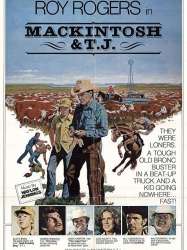
Mackintosh and T.J. (1976)
Directed by Marvin J. Chomsky
Origin USA
Genres Drama, Western
Actors Roy Rogers, Joan Hackett, Billy "Green" Bush, Andrew Robinson, James Hampton, Dennis Fimple
Roles Mackintosh
Rating68%





MacKintosh (no first name is ever given) is an aging migrant cowboy drifting from ranch to ranch doing odd jobs along the way with the exception of his World War II service in the Pacific. When passing through a town he sees T.J. (no other name is ever given) a 14-year-old recently released from doing clean up work for vagrancy. Shopping for supplies, MacKintosh sights T.J. preparing to steal an apple being watched by the store owner. MacKintosh pretends the boy is with him and pays for their supplies.

The Movie Orgy (1968)
Directed by Joe Dante
Origin USA
Genres Comedy, Documentary
Themes Documentary films about business, Documentary films about the film industry
Actors Ann-Margret, John Lennon, Paul McCartney, George Harrison, Ringo Starr, Walter Brennan
Roles Self (archive footage)
Rating77%





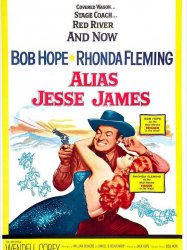
Alias Jesse James (1959)
, 1h32Directed by Norman Z. McLeod
Origin USA
Genres Comedy, Action, Western
Themes Films about families, Jesse James, Gangster films
Actors Bob Hope, Rhonda Fleming, Will Wright, Wendell Corey, Jim Davis, Mary Young
Roles Roy Rogers (uncredited)
Rating63%





Milford Farnsworth (Hope) is a bumbling insurance agent who unknowingly sells a life insurance policy to the outlaw Jesse James (Wendell Corey). Farnsworth is sent out West to protect the insurance company's investment by "protecting" James.

Son of Paleface (1952)
, 1h35Directed by Frank Tashlin
Origin USA
Genres Comedy, Action, Romance, Western
Actors Bob Hope, Jane Russell, Roy Rogers, Lloyd Corrigan, Bill Williams, Douglass Dumbrille
Roles Roy Barton
Rating67%





Peter "Junior" Potter (Hope) has graduated from Harvard and now heads west to the town of Sawbuck Pass to claim his Daddy's fortune. Driving into town in a jalopy and wearing a comical plaid suit, he splashes mud all over a crowd of townspeople. He also discovers to his horror that practically everyone in town claims to be owed a debt, and that his father's treasure chest is empty.

Heart of the Rockies (1951)
Directed by William Witney
Origin USA
Genres Western
Actors Roy Rogers, Gordon Jones, Ralph Morgan, Fred Graham, William Gould, Pepe Hern
Roles Roy Rogers
Rating60%





Roy est chargé d'un projet de construction d'autoroute. Un éleveur essaie d'empêcher Roy de construire une autoroute sur ses terres parce qu'il craint que les autorités ne découvrent la manière sans scrupules dont il l'a obtenu.

In Old Amarillo (1951)
Directed by William Witney
Origin USA
Genres Western
Actors Roy Rogers, Roy Barcroft, Elisabeth Risdon, Pierre Watkin, Pincus Leff (aka "Pinky Lee"), Estelita Rodríguez
Roles Roy Rogers
Rating60%





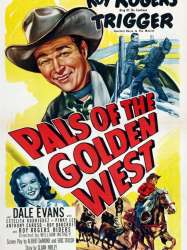
Pals of the Golden West (1951)
Directed by William Witney
Origin USA
Genres Western
Actors Roy Rogers, Dale Evans, Roy Barcroft, Estelita Rodríguez, Anthony Caruso, Ken Terrell
Roles Roy Rogers
Rating60%





Le patrouilleur de frontière Roy Rogers reçoit la mission d'empêcher le bétail mexicain, porteur de la maladie du sabot et de la fièvre aphteuse, de franchir la frontière. Il conclut un accord de coopération avec le commandant Lopez, qui a une mission analogue sur la rive mexicaine. Mais celui-ci est sauvagement abattu alors qu'il tentait d'intercepter un troupeau.

South of Caliente (1951)
, 1h7Directed by William Witney
Origin USA
Genres Action, Musical, Western
Actors Roy Rogers, Dale Evans, Douglas Fowley, Willie Best, Ric Roman, Pincus Leff (aka "Pinky Lee")
Roles Roy Rogers
Rating64%





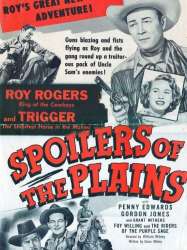
Spoilers of the Plains (1951)
Directed by William Witney
Origin USA
Genres Action, Adventure, Western
Actors Roy Rogers, Gordon Jones, Grant Withers, Don Haggerty, House Peters, Jr., George Meeker
Roles Roy Rogers
Rating62%





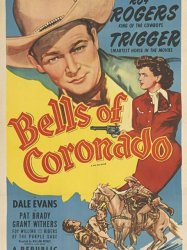
Bells of Coronado (1950)
Directed by William Witney
Origin USA
Genres Western
Actors Roy Rogers, Grant Withers, Dale Evans, Clifton Young, Robert Bice, Stuart Randall
Roles Roy Rogers
Rating60%





Un enquêteur d'assurance doit retrouver les voleurs avant qu'ils ne décollent dans un avion avec du minerai d'uranium volé.
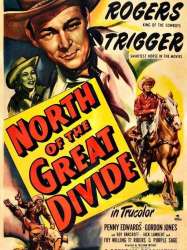
North of the Great Divide (1950)
, 1h7Directed by William Witney
Origin USA
Genres Western
Actors Roy Rogers, Roy Barcroft, Noble Johnson, Jack Lambert, Gordon Jones
Roles Roy Rogers
Rating60%





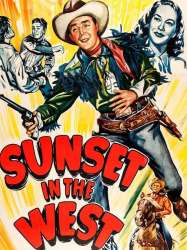
Sunset in the West (1950)
Directed by William Witney
Origin USA
Genres Western
Actors Roy Rogers, Estelita Rodríguez, William Tannen, Gordon Jones, Will Wright, Pierre Watkin
Roles Roy Rogers
Rating58%





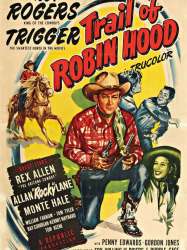
Trail of Robin Hood (1950)
Directed by William Witney
Origin USA
Genres Western
Actors Roy Rogers, William Farnum, Tom Tyler, Gordon Jones, Tom Keene, Jack Holt
Roles Roy Rogers
Rating59%





Roy is a conservation agent preventing loggers from poaching Jack Holt's Christmas trees.

Trigger, Jr. (1950)
Directed by William Witney
Origin USA
Genres Action, Western
Themes Films about animals, Films about horses
Actors Roy Rogers, Grant Withers, Dale Evans, Gordon Jones, Peter Miles, Frank Fenton (Moran)
Roles Roy Rogers
Rating59%





Manion (Grant Withers) allows a killer horse to roam free and ruin valuable horses on nearby ranches. His plan is to "shakedown' the ranchers for protection. Roy (Roy Rogers) tracks down the bad guys with help from a young lad.

Twilight in the Sierras (1950)
, 1h7Directed by William Witney
Origin USA
Genres Western
Actors Roy Rogers, Dale Evans, Estelita Rodríguez, George Meeker, Edward Keane, House Peters, Jr.
Roles Roy Rogers
Rating60%





An ex-outlaw is kidnapped and used for his considerable criminal finesse, despite now being on the straight and narrow. It is up to Roy Rogers to rescue him.
 Connection
Connection




